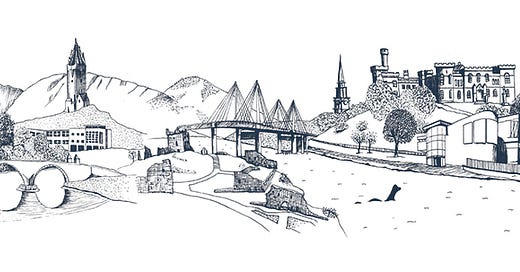When we wrote to you nine weeks ago, the world had just entered uncharted territory. The pandemic arrived quickly, and it sent our governments, economies, businesses and everything else into a global whirlwind of worry and confusion.
Lockdown has been challenging for everyone, but we hope you’ll agree there have also been some fantastic conversations along the way — not least the ones prompted by our longform series exploring the future of Scotland’s seven cities.

Our stories have weaved together some of the 21st century’s biggest trends to offer a glimpse of how people, policymakers and businesses might take collective advantage in the years to come. Wherever you are in the world, we hope you’ve found the journeys as interesting to follow as we found them to take.
At the beginning of this project, we set out to demonstrate how foresight and design can empower people to navigate the shifting possibilities and perspectives in the world around us. Our tour of Scottish cities has showcased global thinkers and local changemakers alike, and there’s been a lot to take in.
This is the last email in the longform part of the series but we’ll be organising a few Q&A sessions to build on the ideas we’ve shared over the coming months. We’ll send you the occasional email to let you know about our future work on this theme. In the meantime, we’ve put together a brief recap of where we went and what we learned in Future Cities Scotland. Thanks for joining us.

Glasgow
In Glasgow, we delved into foresight methodologies to assess the city’s future prospects as a global space leader. As the world faces its toughest challenges since World War II, this story underlines the importance of us defining and pursuing ambitious and inspiring long-term futures for our communities

Edinburgh
The Edinburgh story saw us examine the possibility of the Scottish capital going rogue, powered by fast-emerging networks of other cities with similar interests and priorities. The weakest aspects of our democratic institutions in a crisis—would we fare better if governance was organised around cities instead of nation-states?

Aberdeen
In Aberdeen, we explored the challenges and opportunities involved with transitioning from an economy based on fossil fuels to one based on renewables. We learned that collaborative efforts involving a range of stakeholders are what get things done in this area. COVID-19 has done everything to reinforce the importance of these collaborations.

Inverness
We took Inverness as a case study in the global trend of rural to urban migration, unearthing the tensions this is prompting alongside possible solutions. Coronavirus has put the spotlight on localised supply chains—something that will require more collaboration and dialogue between cities and their rural neighbours.

Dundee
We met innovators in Dundee who are leveraging design and gaming talent to spearhead a brand new industry in emotional resilience. The need for this kind of endeavour has never been more urgent. With recent lockdowns across the world, any focus on mental health and bolstering people’s strength is welcome.

Stirling
We also visited Stirling to see how cities can transition to zero waste and begin adopting circular economy principles as part of their strategy. With cities like Amsterdam announcing they’ll take a “doughnut” approach to post-pandemic recovery, this small Scottish city could turn out to be an early adopter.

Perth
Our Perth instalment examined the future of work and how this small city is harnessing its unique culture to bolster the local business ecosystem, with a firm focus on human outcomes. This story was in production long before the pandemic, but its contents are now more relevant than ever.

Acknowledgements
The Future Cities Scotland series involved a collaborative process between a variety of talented people all over the world, and we feel privileged to have had them contribute.
Thanks to Lauren Razavi for concepting and managing the project, Robyn Johnston for her gorgeous illustrations each week, and our friends at the Institute for the Future for their framework. We’re also grateful to Jesse Norton, Sabrina Faramarzi and Ebony-Storm Halladay for their transcription, research, writing, editing and design.
And, of course, to our amazing interviewees: Gemma Milne, Christopher Newman, Pieter Van Glind, Derek Wyatt, Lynn Mutch, Alix Bolle, Sarah Skerratt, Bettina Bock, Manjul Rathee, Lorenzo Pergola, Theresa Thomasson, Jack McQuibban, Lynne Martin and Matthew Mottola.
Stay in touch
Read more insights from the Nile team over on our Medium publication, Strategic Design Stories. Share your thoughts and feedback on the series by hitting reply or emailing hello@nilehq.com.



